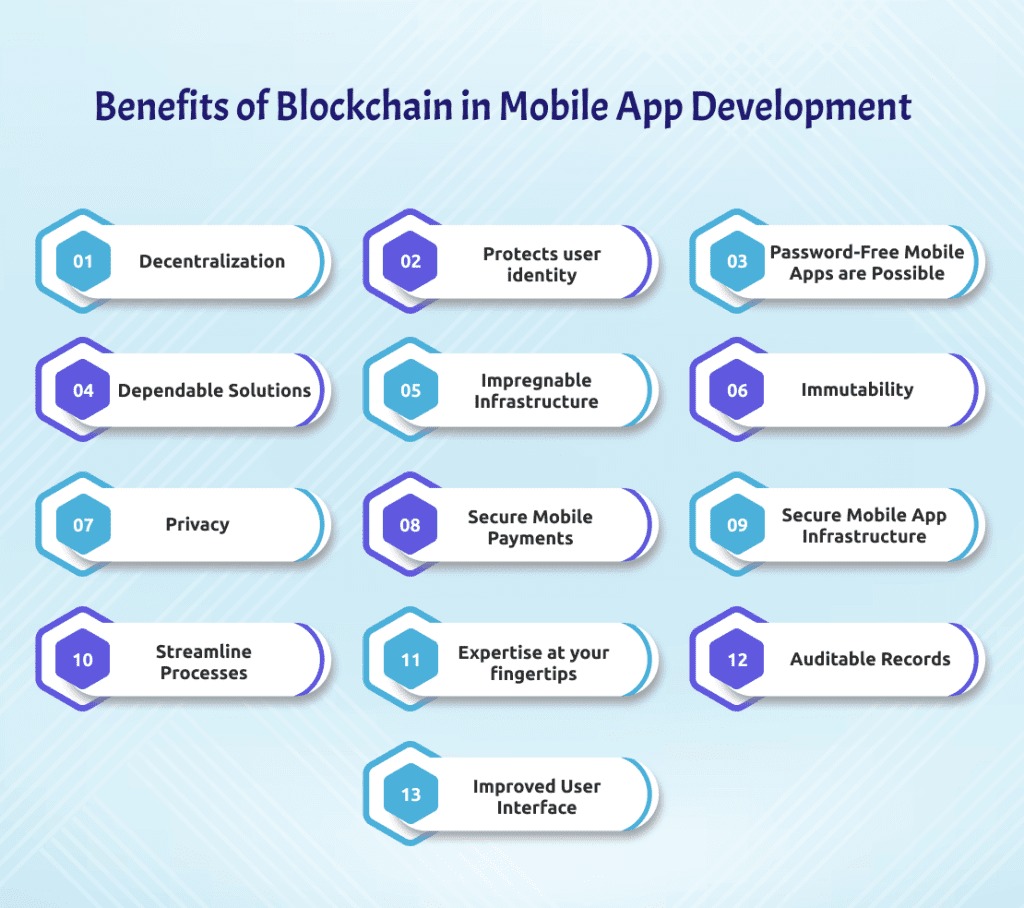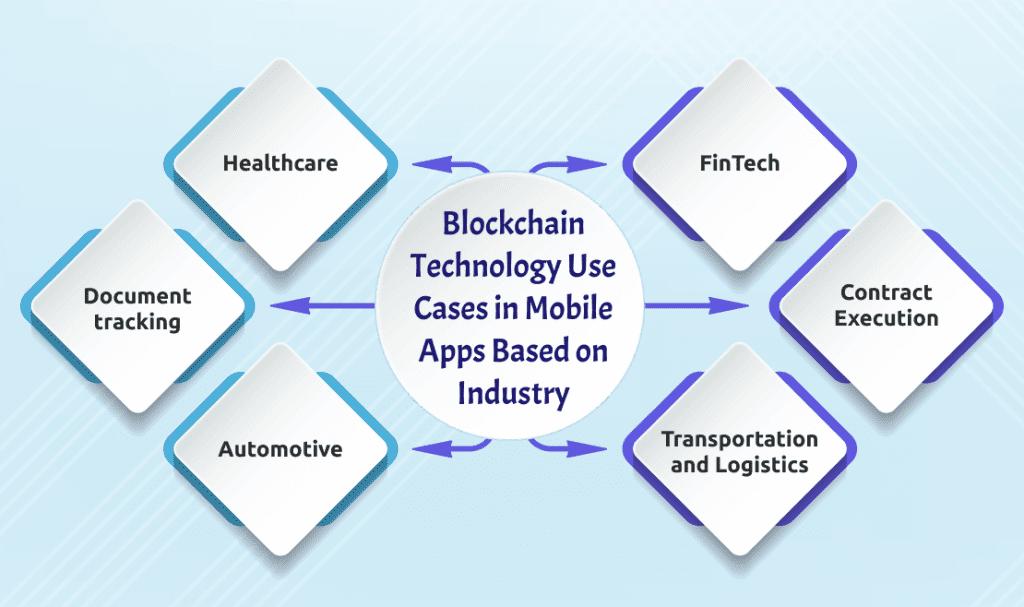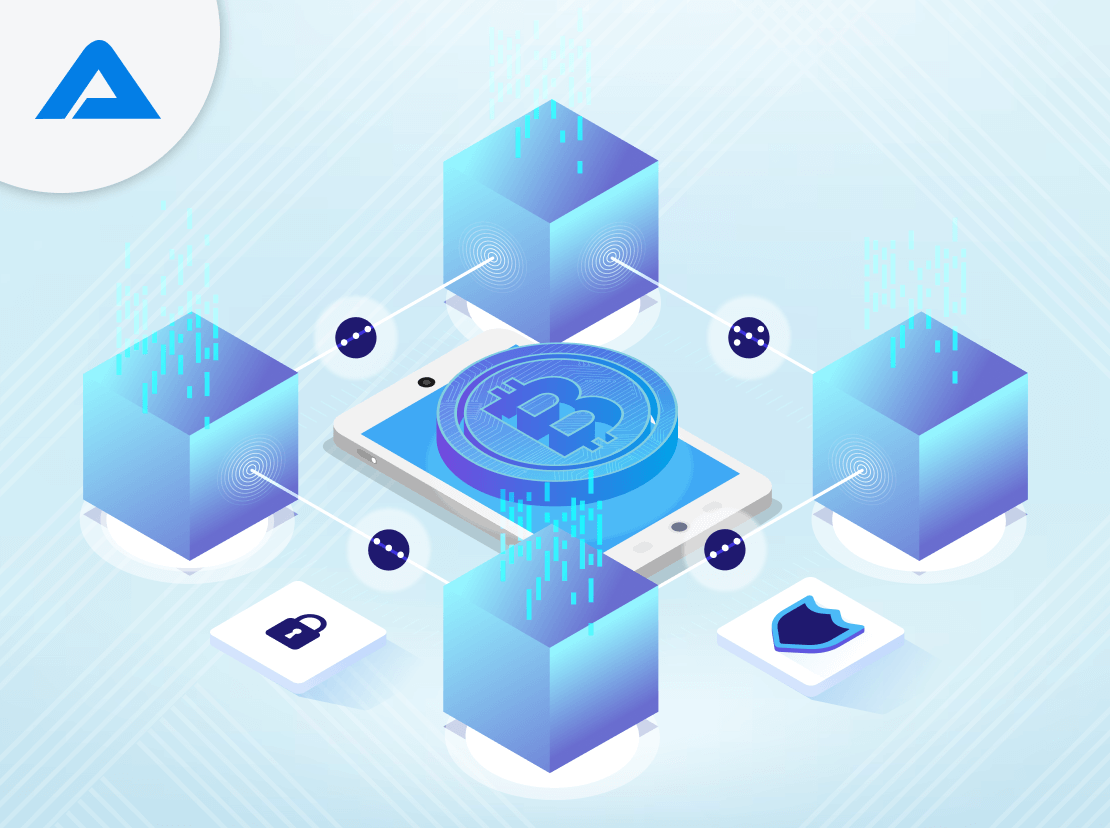Blockchain has quickly emerged as one of the hottest emerging tech trends. Businesses of all types – both large and small – have rapidly adopted this ground-breaking system into their IT infrastructures to take full advantage of this exciting breakthrough technology.
Blockchain has long been recognized for providing innovative mobile app development solutions that improve transaction speeds and security while increasing transaction rates and usability across global organizations.
Blockchain technology represents an exciting trend with wide-ranging potential uses. It’s also interesting to note that cybercriminals can now see the mobile apps. Cyber-attacks can be dangerous, compromising mobile security. They may compromise private data or hack into devices.
This article will examine the benefits of Blockchain technology and how blockchain development service are enhancing mobile app security by providing businesses and clients with smart solutions.
What is Blockchain Technology?
You can think of the blockchain as a decentralized database. It is a distributed database that can’t be altered, hacked, or manipulated.
Blockchain technology eliminates the need for any central authority or server. It is essentially an electronic ledger that records transactions across a distributed network of computers.
All independent network nodes participate similarly before a new data block is added to the chain. This process ensures the integrity and security of the data.
This technology imposes transparency as each transaction or data interaction on the blockchain is visible to everyone and has a timestamp attached.
How could this technology help developers create better mobile apps? We’ll now show you the main benefits of using blockchain technology to develop mobile apps.
Why Blockchain for Mobile App Security?
Such thoughts may occur to you. Anti-virus, such as Norton 360 software, and other security measures are already available. Why should you hire a blockchain app development company to ensure mobile security? Anti-virus software is often used to protect app data from hackers.
It is the device that we use. Smartphones with advanced features are great, but there are many security holes. Security cannot be based on software. Your apps must be protected from hackers with advanced skills. Here’s why. To keep your apps secure, blockchain is essential.
The blockchain is a powerful tool that makes it nearly impossible to change any data in the system. It also guarantees 100% data transparency among all stakeholders regarding mobile app security.
According to a new report, the global market for blockchain technology is expected to reach $7.7 billion in 2024.
Blockchain’s simplicity is the main reason for its proliferation. It is also easy to use. Integrating your encrypted and complex data into highly secure and strengthened systems is very quick. This is why financial institutions and banks invest millions to explore the potential of the technology.
We will now discuss some of its features, making it an ideal choice for mobile application security.
Benefits of Blockchain in Mobile App Development

Blockchain technology is a powerful tool in mobile finance. The technology can address fundamental issues such as financial inclusion, cost, and security.
Blockchain can take mobile apps to a new level of security and transparency, crucial in finance technology (fintech), healthcare, and the pharmaceutical industry.
This technology could disrupt institutions, from banks to credit unions and insurance companies. Blockchain adoption would help businesses not only retain their competitive edge but also give them a boost by adding an extra layer of security to mobile apps.
These cybersecurity benefits can help security leaders improve the mobile app security of their apps.
Decentralization
Blockchain’s decentralized architecture offers several benefits for mobile applications. The system has no single point of failure, so any malfunction at the top does not negatively affect the entire system.
Client-server apps are distributed in their entirety. The information and protocols that are stored on the blockchain are encrypted. Apps are typically open-source, and tokens are issued to network users as a reward. An algorithm is responsible for the overall network governance.
Mobile apps are based on a user-server system, whereby the mobile app and phone act as users, and the central server provides data when requested. Multiple users are attempting to wirelessly access data, which can lead to some information being lost.
Decentralization, resulting from blockchain adoption, allows advanced data storage and streaming capabilities to flow into mobile apps, creating more opportunities for security leaders.
Protects user identity
All businesses generally have a server in their office to store and maintain data. These servers are, however, the most vulnerable assets. Hacking these servers is the job of a novice, as they are easy to breach and have apparent vulnerabilities.
Although there are many security approaches and practices for servers, such as SSH and SSL, VPN, and others, more is needed to guarantee security for server applications.
Blockchain does not store data on any servers. The data is stored in the system, and hackers cannot attack the entire system. Data is stored in blocks on the blockchain, and it is nearly impossible to breach them.
Moreover, only some have the authority to change data in these blocks. Cryptography using secret key encryption ensures that no data can be misused.
Password-Free Mobile Apps are Possible
Passwords are so ingrained in our lives that we can’t imagine a world without them. It is not rocket science for hackers to hack or leak passwords. No matter how difficult and complicated the passwords that you use for your smartphone, they will still be vulnerable.
Blockchain, on the other hand, can eliminate the requirement for passwords. You can then have apps that don’t require a password on your smartphone. These are very difficult to hack.
Simple. If your app uses blockchain, no one can transact without letting the other stakeholders know. You don’t have to verify your identity to use the application since no one else can use it without you. All you have to do is hire blockchain app developers.
In the decentralized system, all parties, including payment, can track transactions. The blockchain network also reviewed all transactions and the authenticity of depositors, among other things. All of these details are available to all. No one is allowed to enter the system unnoticed.
Dependable Solutions
Incorporating Blockchain technology into mobile app security increases the dependability of applications. App failure is eliminated.
The nodes of the blockchain are spread out around the globe, and they remain in sync. This indicates that a copy of the same data has been duplicated on multiple devices at different locations.
Blockchain is decentralized, so there are less chances of it collapsing or crashing. Mobile app development is made more reliable by blockchain technology.
Impregnable Infrastructure
Blockchain-based apps also benefit from the blockchain’s decentralized platform, which is more reliable and secure. The brand infrastructure is moved to the decentralized zone.
The DNS, or Domain Name System, is another area that benefits from the blockchain. It provides complete control over the domain records. It is, therefore, next to impossible for anyone to alter the domain records.
Immutability
A blockchain is a way to store data across an extensive network of computers. The data cannot be changed or destroyed once added to the blockchain blocks. The blockchain is designed so that every new block contains a reference with the previous block. Due to this, even if a hacker can corrupt the data in a single block, they will still need to change the data for every other block. This is both logically and practically impossible.
Privacy
By storing the DNS entries on the blockchain, app owners can shift the risk of hacking onto the blockchain. Even the government can only access the distributed and transparent DNS provided by the technology with the consent of users. Blockchain maintains user privacy by encrypting information and allowing only authorized users to access it. This could help limit unauthorized access to private information such as financial or medical records.
Secure Mobile Payments
Blockchain is a peer-to-peer decentralized network that allows for quick, secure, and contactless payments. You can make payments by simply sharing the account information of the recipient.
Payments can be made securely and cheaply using the peer-to-peer system. Blockchain can be used to ensure mobile payments are secure.
Secure Mobile App Infrastructure
It is possible to store DNS records on a decentralized blockchain platform when your app integrates blockchain technology. Hackers will need help to breach such infrastructure. The system controls the user data, and the transparent DNS makes it difficult for hackers to hack into the system.
If government agencies want to change any records, they must get the consent of all stakeholders.
Keyless Security Infrastructure, or KSI, is the reason. Blockchain stores all data in cryptographic hash format. The hashing algorithm can be used for verification. This algorithm’s main benefit is the ability to identify and track any manipulations in real-time, resulting in superior app security.
Streamline Processes
Hiring a blockchain-based app development company can also streamline your processes. Blockchain technology allows specific processes to be automated, including data transfer and funds. It can help businesses save money and time by eliminating the need for manual labor. Blockchain technology also allows for secure data transfer, which can improve processes. Hiring a blockchain application development company can help businesses to save money and time by streamlining their processes.
Expertise at your fingertips
A blockchain app development firm can provide businesses with expertise. Many companies must gain the knowledge or experience to create their apps, as blockchain technology is still relatively new. Hiring a blockchain development company will ensure your app is developed correctly and efficiently. A blockchain app development firm has developers who are experts in their field, and they can offer valuable guidance and advice throughout the entire development process.
Auditable Records
Businesses can access auditable records by hiring a blockchain app developer. Businesses can access all records as blockchain technology stores transactions in a distributed ledger. Businesses can benefit from this technology, which allows them to monitor and track transactions and detect fraudulent activity.
Improved User Interface
Hiring a blockchain app developer can improve the user experience for businesses. Users can stay assured that their personal data will be safe and secure as blockchain technology is reliable and secure. The distributed ledger can also help users have a smooth and efficient experience as transactions are completed quickly and efficiently. It can also benefit businesses as it increases customer satisfaction and loyalty.
How to Integrate Blockchain in Mobile Apps for Better Security?
Choose the design architecture that best suits your needs. You can choose to implement a hybrid solution, a cloud-based solution, or an in-house blockchain hosting. This should be done per your technology stack and operating system (such as iOS/ Android) on which you will implement it.
Build an app with a clear and well-organized UI that provides an excellent experience for the user. The control panel on the backend should also be monitored to ensure the smooth functioning of the network.
Through blockchain-integrated apps, even developers can gain significant profits. App stores receive a large portion of the revenue generated by in-app purchases. Blockchain allows developers to reward users for using their app for a certain period by creating a smart contract based on blockchain. This eliminates the need for third parties.
1. Choose the right blockchain platforms. You can integrate multiple platforms with your app, including Ethereum, Avalanche Hyperledger Eris, and Multichain. It is essential to research each forum thoroughly to determine which best suits your app.
2. Once you have identified the app features that will be used through the platform, integrate them. After identifying these features, you can integrate them to protect your app against all cyberattacks.
3. Limit the number of transactions to track data inflow and output. This will make your app more organized and easier to manage.
4. Create a community on blockchain that allows developers to help grow your app. It can be beneficial in the long term.
5. You can either hire blockchain app developers in-house or outsource them. It depends on your budget, team size, and requirements. These developers will help you implement the blockchain model and get started on the blueprint.
Blockchain Technology Use Cases in Mobile Apps Based on Industry

We have already mentioned that blockchain is a platform for data management, which means that all solutions in the Blockchain domain will be centered around data storage. These use cases show how blockchain development services can be used by businesses to achieve transparency and immunity.
Healthcare
The blockchain has revolutionized the healthcare industry to a large extent. It maintains a transparent and universal version of the patient’s medical information. Blockchain technology has enabled medical professionals to offer instant care for patients because of updated and organized records.
Blockchain can also verify the authenticity of drugs. It is possible to trace the origin of any chemical or drug. It has benefited manufacturers who have to recall certain chemicals used in aid drugs.
FinTech
FinTech and blockchain have brought peace to the average bank customer by automating most of their financial processes. Transparency and immutability are also added to help prevent disputes. Customers can now use smart cards with blockchain services. Smartcards allow faster settlement of funds without any central authority verifying them.
Document tracking
Blockchain technology provides a distributed and immutable tracking system for documents. All participants have equal access to information by storing documents on blockchain. Blockchain technology also ensures that documents are secure because it is unalterable.
Contract Execution
Blockchain’s smart contract service provides a platform for contract execution that promises high levels of transparency. The distributed nature of the system implies that all parties must be equally informed.
Automotive
The automotive industry’s biggest challenge is managing supply chains and preventing counterfeit parts. A blockchain platform can provide end-to-end records of the transport of automotive parts. This allows automobile companies to track genuine spares and distinguish them from counterfeits.
Blockchain services have also disrupted industry efficiency. Businesses can produce optimally with minimal downtime, and there is no shortage of essential parts.
Transportation and Logistics
Both the transport and logistics industries rely heavily on the identification of goods and passengers. Passengers can make the process easier and faster with a single token.
Blockchain platform-as-a-service is a failsafe mechanism that industries and other data silos can use.
Blockchain Attracted the Attention of Mobile App Developers
Most start-ups must determine the balance between the Bitcoin Blockchain and the current model to understand the Blockchain application process. Start-ups would only be able to use it if they could integrate it with a peer-to-peer money system. The start-up would have to consider the compatibility of its requirements with the Bitcoin Blockchain Infrastructure.
It is essential to ensure that mobile transactions are safe so that users of mobile apps can trust them. TelCoin and telecom companies have a great example of how Blockchain technology can be used to create a mobile payment application. This example is limited to mobile payments only and does not include bank transactions.
Blockchain is already affecting start-ups such as Landmapp, which are using it to reduce the costs of land titles and develop documentation services for land rights in countries like Africa. ShelterZoom and other apps also use Blockchain-based services to streamline Real Estate offers and secure contracts. IBM and other major IT companies are exploring blockchain’s network identification capabilities to make it easier for users to verify their identities on mobile apps.
The Key Takeaway
The Blockchain revolution is here and will not go away! We can expect to see many more app developers utilizing the benefits of blockchain in the future. Blockchain is the clear winner as it offers greater transparency, security, and efficiency than any other digital technology. This technology has been developed to streamline transactions and maintain complete transparency through a distributed ledger system.
Here are a few examples of how blockchain development solutions for mobile apps can influence development. We can confidently predict that mobile app development will benefit from blockchain’s unparalleled visibility, reliability, and productivity.
This ground-breaking innovation allows developers to create mobile apps that are safe, accessible, and easy to use. It also opens up a vast universe of possibilities for programmers and users. AddWeb Solution, one of the best blockchain companies for mobile apps, will help you achieve this by providing accurate advice on making the most of mobile application frameworks.
